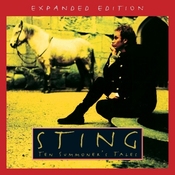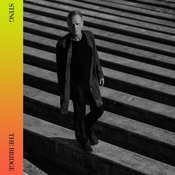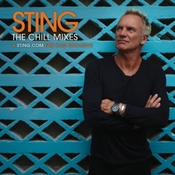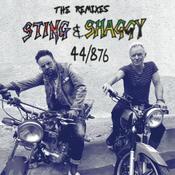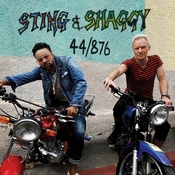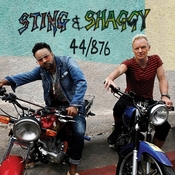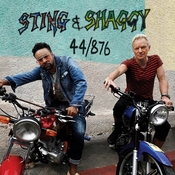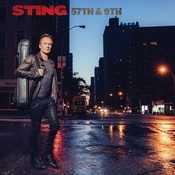44/876 (Super Deluxe)
- 44/876 (ft. Morgan Heritage and Aidonia) lyrics
- Morning Is Coming lyrics
- Waiting For The Break Of Day lyrics
- Gotta Get Back My Baby lyrics
- Don’t Make Me Wait lyrics
- Just One Lifetime lyrics
- 22nd Street lyrics
- Dreaming In The U.S.A. lyrics
- Crooked Tree lyrics
- To Love And Be Loved lyrics
- Sad Trombone lyrics
- Night Shift lyrics
- Englishman In New York – Sting (Live at Shaggy & Friends, Kingston, Jamaica)
- Fields Of Gold – Sting (Live at Shaggy & Friends, Kingston, Jamaica)
- Message In A Bottle – Sting ft. Agent Sasco (Live at Shaggy & Friends, Kingston, Jamaica)
- Don’t Make Me Wait – Sting & Shaggy (Live at Shaggy & Friends, Kingston, Jamaica)
- Roxanne – Sting & Shaggy (Live at Shaggy & Friends, Kingston, Jamaica)
- Cherrytree Radio Interview with Sting and Shaggy
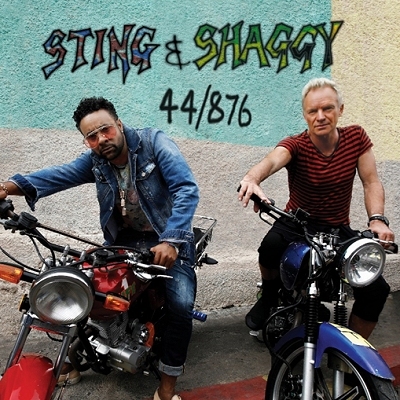
Soundbites
44/876 was recorded in Jamaica and New York with Sting & Shaggy being joined by various musicians and writers including the legendary Robbie Shakespeare of Sly and Robbie, dancehall sensation Aidonia, Morgan Heritage, Branford Marsalis, Agent Sasco and Sting’s longtime guitarist, Dominic Miller as well as writers Taranchyla, Dwayne “iLL Wayno” Shippy, Shane Hoosong, Machine Gun Funk and Patexx. The sessions were produced in part by Sting International (“Oh, Carolina,” “Boombastic” and “It Wasn’t Me,”) and by Martin Kierszenbaum who has previously written/produced songs for Sting, Madonna and Lady Gaga. Sting International, Robert “Hitmixer” Orton, Sting International and Tony Lake mixed 44/876.
Backgrounder
Review from Associated Press by Mark Kennedy
The fact that Shaggy and Sting are teaming up on a CD does, admittedly, sound like a gimmick. Why are these two very different artists together? Because they happen to be known by a single name? Why not keep going and add Shakira, Sia, Slash and Seal?
Maybe one day, but put the snarkiness aside and enjoy this warm bromance between the Jamaican dancehall king and the cool, intellectual Englishman.
“44/876” - the title is a combo of the phone country codes for Sting’s native England and Shaggy’s Jamaica - makes sense as soon as you recall Sting’s liberal use of reggae rhythms as part of The Police.
It turns out there’s real chemistry between Shaggy, whose deep, thick cadences made “Boombastic” and “It Wasn’t Me” such beloved hits, and Sting’s flexible, honeyed voice.
The duo helped write every song on the 12-track album and their collaboration has triggered some interesting - some might say curious - songwriting, including lifted poetry from Lewis Carroll for “Just One Lifetime” and some role-playing (Shaggy portrays a judge and Sting a defendant on the innovative “Crooked Tree”).
The first, title song smartly honors Bob Marley - Sting says Marley’s ghost “haunts me to this day/ There’s a spiritual truth in the words of his song” - as a way of inoculating everyone for this quirky offering. Then it’s off to more trop-hop on this sunny Caribbean jaunt.
There’s the pro-immigrant, Motown-inflected “Dreaming in the U.S.A.” where Shaggy, a former U.S. Marine, notes he defended the nation. That adds weight to his statement: “I await the day when we will all inhabit a better America.”
Sting, for his part, seems fed up with Britain: “The politics of this country are getting to me,” he sings in one song. Then in the slinky standout “Waiting for the Break of Day,” he hits again: “You see some politicians/ You hear the things they say/ You hear the falseness in their positions.”
Branford Marsalis stops by to play sax and Robbie Shakespeare helps on bass. Sting’s daughter, Eliot Sumner, gets a writing credit and sings on “Night Shift.”
You soon realize that Sting and Shaggy need each other, nowhere more so than on “22nd Street,” which is like a rejected cut from “The Dream of the Blue Turtles” until Sting’s delicate china shop is entered by Shaggy and his bearish voice.
The album’s first single, “Don’t Make Me Wait,” a sway-inducing pop song with a reggae sheen, turns out to be only a taste of what these men can bring, their two vocal and musical styles melding into something as delicious as a plate of jerk chicken washed down with a cold beer.
Review from The Daily Mail by Adrian Thrills
Sting has sung with jazz musicians and rappers, written a musical about shipbuilding on his native Tyneside and released an album of Renaissance lute music. But his latest escapade - a set of Caribbean-themed songs with dancehall reggae star Shaggy - is his most improbable yet.
The record takes its title from the international dialling codes for the UK (44) and Jamaica (876) and is a sun-kissed mix of pop and reggae.
After being introduced by Sting's manager, who used to work with Shaggy, the unlikely couple got together to record a duet, Don't Make Me Wait, and were so happy with the results that other songs soon followed.
The fruits of 'Shaggy and Sting inna combination' are sometimes rather gimmicky, but 44/876 avoids sounding like a vanity project by making the most of the pair's respective strengths: String's meticulous songwriting; deep-voiced Shaggy's spontaneity and flair.
The two are fairly evenly matched. Sting, 66, achieved global fame with The Police. Shaggy, 49, is a former US marine who moved from Jamaica to Brooklyn as a teenager.
Having taken his stage name after a character in the TV cartoon Scooby-Doo, he has topped the UK chart four times with hits such as Boombastic and It Wasn't Me.
The duo's initial duet sets the tone: Don't Make Me Wait finds Shaggy playfully parading his lover man credentials. 'It didn't take me long to fall in love with your mind,' he sings.
Elsewhere, bassist Robbie Shakespeare and saxophonist Branford Marsalis contribute to a set of tuneful, good-natured songs that, despite Sting's thoughtful lyrics, refuse to take themselves too seriously.
Crooked Tree is a courtroom playlet that casts Shaggy as the Honourable Judge Burrell - his real name is Orville Burrell - and Sting as a contrite defendant. The Police-like Dreaming In The USA salutes a gallery of American cultural idols, including Elvis, Sinatra and Marilyn Monroe, before Shaggy delivers the damning kiss-off line: 'I await the day when we will all inhabit a better America.'
There are numbers on which Sting takes the lead. With its gentle flute and lively fret-work by the singer's touring guitarist Dominic Miller, 22nd Street could have come straight off a Sting solo project, with Shaggy's raspy patter an afterthought.
But the songs where Mr. Boombastic takes centre stage are the most entertaining. Waiting For The Break Of Day is a languid piano piece lamenting the 'falseness' of politicians. To Love And Be Loved is an unashamedly poppy track that finds Sting admitting he has 'two left feet' when it comes to dancing. Accompanied by fairground organ, it's a bubbly, Shaggy-directed paean to good times - and all the better for that.
Review from Daily Telegraph by Neil McCormick
There is something about the combination of Sting and Shaggy that seems inherently ludicrous: Mr Boombastic Loverman meets Tantric Sex God in a pop/reggae pile up. These two swaggering old mononymous male stars seem to belong to different corners of the musical universe. Sting, 66, is rock royalty – a virtuoso musician and supreme singer-songwriter with intellectual pretensions, who dabbles in folk, classical and opera. Shaggy, 49, is an ebullient Jamaican toaster with a gritty voice and penchant for fruity innuendo.
At the suggestion of their shared management, Sting agreed to sing a hook on a Shaggy single, the sunny Don’t Make Me Wait, and the pair got on so well that the sessions expanded into a whole album of original songs.
The title track, 44/876 – named after the respective international dialling codes for Britain and Jamaica – commemorates their transatlantic friendship. Over a breezy Caribbean groove, Sting confesses that “the ghost of Bob Marley haunts me to this day”, while Shaggy adds enthusiastic interjections: “Big up the UK, man, yeah, bam bam!”
I’m tempted to say it is surprisingly good – yet why should we be surprised? They are both gifted, charismatic veteran musicians with very distinctive skills. The blend of Sting’s sweet, high tenor and top-tier songwriting with Shaggy’s earthy delivery and rhythmic bounce has an effortless appeal. Sting’s early success with the Police was rooted in reggae and it’s a flow that suits him well, even if his excruciating delivery of the phrase “positive vibration” is some of the dodgiest white patois heard since 10CC’s Dreadlock Holiday.
There’s a hefty dollop of cheese on poppier tracks. The way Sting drops in such lines as “as my good friend Shaggy says” brings to mind Frank Sinatra and Dean Martin hamming it up in Vegas. These kind of guest star combinations have become a feature of modern pop and it’s a nice reminder that the oldies can duet, too. The Shaggy-led Gotta Get Back My Baby is such a fantastically catchy pop song it is a pity it will most likely be relegated to the Radio 2 playlist. If Bruno Mars and Drake recorded the same track, there’d be no escaping it.
Musically, Sting does the heavy lifting, with Shaggy dipping in and out as wing man, proclaiming “biddy bong bong” as the mood takes him. But aside from the more obviously playful pop, there are songs with tough political and emotional edges. The brooding Waiting for the Break of Day puts Sting on a picket line: “When the laws are wicked / You’re forced to disobey.” Just One Lifetime twists Lewis Carroll’s The Walrus and the Carpenter into a nursery rhyme for the apocalypse. While 22nd Street sounds like a lost Gershwin classic given a lover’s rock twist. Crooked Tree is a dark, narrative folk song, with Shaggy voicing a hanging judge, while Sting pleads for clemency. Sad Trombone is a noirish jazz ballad built around audaciously overblown musical similes and metaphors. These songs are strong enough to fit anywhere into Sting’s impressive canon, delivered with an energy and focus that keeps his tendency to over-elaborate at bay.
What I like most is the sense that these two musicians are beyond caring about perceptions, simply determined to have fun.
Review from Newsweek by Glenn Gamboa
The unlikely rock-reggae odd couple find a surprisingly sweet middle ground.
The musical partnership between Sting and Shaggy seems weird, not because of their musical styles, but because of their personal ones.
Sting has cultivated an oh-so-serious rock persona for decades, both in The Police and out of it, while Shaggy, who splits his time between Jamaica and Valley Stream, has painted himself - in America, at least - as a reggae prankster. How would these two big personalities work together?
Well, judging from their “44/876” album (A&M/Interscope), Sting and Shaggy could probably have benefited from a bit more disagreement. On “44/876,” named for the country codes for Sting’s native United Kingdom and Shaggy’s native Jamaica, they often sound deferential when a stronger blend of their styles would have worked better.
Their collaboration is strongest when Sting buys into Shaggy’s reggae-pop vibe, like on the playful “To Love and Be Loved” of the Bob Marley-influenced “Morning Is Coming.” The first single “Don’t Make Me Wait” kickstarted the partnership when Shaggy’s former A&R rep Martin Kierszenbaum played the song for Sting, whom he now manages. It works well because it’s essentially a Shaggy song, with its catchy, lilting chorus and gentle reggae groove. On the other end, “Waiting for the Break of Day” sounds like it could have come from Sting’s “Ten Summoner’s Tales,” enhanced by Shaggy’s toasting. They create something new on “Dreaming in the USA,” a love letter to America that combines Motown with Police-like guitar riffs that shows how crafty Sting and Shaggy really can be.
Where they run into problems is when Sting gets a little too wrapped up in clever imagery. On “Sad Trombone,” he goes from one metaphor to the next, while Shaggy’s straightforward contribution only draws more attention to lines about being “the butter to my toast.”
Sting and Shaggy have found a special connection on “44/876,” one that could blossom into something bigger in time.
Review from The National by Adam Workman
Unlikely pairing of Sting and Shaggy dials up the spirit of Marley for some rays of pop-reggae - The unlikely duo make the sun shine on collaborative effort...
Seldom since the Wu-Tang Clan’s Method Man worked with Scottish bores Texas in the late 1990s (Say What You Want) have there been such a “huh?” music combo as this: Sting, the 66-year-old former Police frontman behind enduring hits Roxanne and Message in a Bottle; and Shaggy, the 49-year-old pop-reggae architect of, err, classic singles Boombastic and It Wasn’t Me.
The album title is the international dialling codes of the two artists’ respective countries, and their musical influences similarly meet in the middle – although, while Sting’s familiar tones are tinged with occasional disconcerting Jamaican twangs, Shaggy goes even farther into his patois without a hint of English influence. It’s easy to forget that Sting has dabbled in reggae before, although not as much as Shaggy’s confusingly named producer, Sting International, who handles much of the behind-the-desk work on 44/876.
Sting claims on the opening title track that “the ghost of Bob Marley” haunts him “to this day” – and it does hint at the album’s spirit, which evokes some of the reggae pioneer’s sunniest moments, alongside infrequent darker diversions such as courtroom lament Crooked Tree.
It’s an album that the world wouldn’t have missed were it never conceived, but given that it does exist, the results could have been a lot worse – and that even extends to an unexpected cover of West End show tune Love Changes Everything.
Review from USA Today by Maeve McDermott
Shaggy and Sting's collaborative album '44/876' is a baffling joy...
For the first minute of 44/876, the new collaborative album from Shaggy and Sting that is hotly anticipated if only for its ‘WTF’ novelty, it sounds like the two musicians may just pull this thing off. 44/876 (out Friday) opens with its title track, beginning with a sunny verse from Shaggy celebrating his island roots over charmingly of-the-moment tropical-pop beats, hinting that the joining of forces between the English rocker and the Jamaican dancehall star may not be a total bust.
Then, Sting starts singing.
“It shakes me to my soul with a positive vibration, I start dreaming of Jamaica, the Caribbean nation,” he begins, the clunkiest possible introduction to the album’s ‘Sting does reggae!’ concept, which only gets more amusing when he invokes “the ghost of Bob Marley that haunts me to this day" with all the nuance of a clueless tourist getting his hair cornrowed during an island holiday.
It’s a hilariously unfortunate introduction to an album that certainly has its bright spots. Morning is Coming, the album’s second track, is a better introduction to Sting’s relative talents on 44/876, his lilting vocals a better match for the song’s gentle roots reggae. Of course, Sting is no rookie when it comes to the sounds of Jamaica, drawing from reggae and ska over the course of his career with the Police and in his solo works.
His pairing with Shaggy, best known for his 2000s run of singles including the Steve Miller-interpolating hit Angel and the novelty classic It Wasn’t Me, works best when both singers meet one another halfway between their respective comfort zones, rather than step too far into one another’s worlds. That works both ways, as heard on Shaggy’s clunky attempts to match Sting’s cadences on the poppier Gotta Get Back My Baby.
The album’s lighthearted songwriting verges on treacly at points, mostly when Sting goes on storytelling tangents, jauntily quoting Lewis Carroll on Just One Lifetime - “The time has come, Shaggy said, to talk of many things” - and roleplaying a prisoner in front of Shaggy’s judge on Crooked Tree, before singing about “making the sweetest love” to a woman he nicknames “Sad Trombone” on the song of the same name.
He also seems quite keen to make his political opinions known, dedicating his first verse on 44/876 to complaining about how the “politics of this country is getting to me,” like a party guest determined to harsh the buzz with politics talk.
Save for Sting’s more meandering moments, the album is mostly enjoyable, from its pleasant lead single Don’t Make Me Wait to Dreaming in the U.S.A, the two singers’ Springsteen-in-Jamaica ode to the American dream. 44/876 may get its name from the phone country codes for the artists’ two home countries, England and Jamaica, but there’s something distinctly American-feeling about the album, which sees both its creators as ex-pats, with Shaggy pining for his island home and Sting unimpressed with the politics of Britain today.
Plus, only in America could this gonzo pairing of two stars at various levels of old geezer-dom, truly make sense. And while the world wasn’t exactly clamoring for this album to exist, the end product is more lucid than many likely expected. If anything, 44/876 is proof that both Shaggy and Sting can keep evolving into the later era of their careers, and maintaining a sense of humor about it in the process.
Review from Pitchfork by Evan Rytlewski
The reggae-lite collaboration between Sting and Shaggy is as professional, good-natured, and helplessly uncool as its billing promises.
Why Shaggy? Presumably, if Sting wanted to go 50/50 on a reggae album, he had options. Toots Hibbert is still in fine voice. The Wailers aren’t really the Wailers anymore, but Sting and the Wailers has a hell of a ring to it. And if he were looking to make a splash on the adult contemporary charts, Michael Franti probably could have made it happen. But Shaggy? Mr. Boombastic? The guy who sings like he’s auditioning to voice a breakfast cereal character? Why?
It turns out the two just really hit it off. Sting even refers to “my good friend Shaggy” early on the duo’s unlikely collaboration 44/876, and the album never leaves any doubt that Sting means it. Just look at them posing on those motorcycles, like your parents in their most embarrassing vacation photo. Even when the material falls flat, as it frequently does, there’s some pleasure in picturing these two entirely unobjectionable personalities living their best lives, knocking back Coronas while gently busting each other’s chops with the superficial banter of Liam Neeson and his middle-age golf buddies in the Taken films. It’s such an old-man record you can almost feel your testosterone drop listening to it.
44/876 is as professional, good-natured, and helplessly uncool as its billing promises. Does Sting feign a Caribbean accent? Yes, obviously. Does he fetishize white sandy beaches and honour the ghost of Bob Marley? You know he does. Are there air horns? Yup—all those boxes are checked right out the gate on the opening title track, another inglorious addition to the canon of reggae songs about how great reggae music is. “It shakes me to my soul with a positive vibration, I start dreaming of Jamaica,” Sting sings, standing out like a fanny-packed tourist against unexpectedly contemporary pop-dancehall production fit for a Sean Kingston album. The track’s modern sheen is a fake-out; the rest of the record is more UB40 than Top 40.
In a Rolling Stone profile, Shaggy makes a crack about women getting pregnant to the album’s steamy single “Don’t Make Me Wait,” but by and large the Shaggy here is a far less randy one than the “It Wasn’t Me” Shaggy at the turn of the century. He’s not as miscast as he sounds on paper. Nobody will mistake him for one of reggae’s greats, but he’s a game performer, down for whatever the album throws at him, be it dub, rocksteady, or yacht rock. His toasts colour otherwise colourless songs without disrupting the tasteful romantic vibe Sting sets so carefully. And while there’s some initial absurdity in hearing him opposite Sting, one of the stateliest and most humourless of all of rock elder statesmen, the album never acknowledges it, not even on “Morning is Coming,” where Sting is awoken by to the serene song of a nightingale… that happens to share the severe nasally voice of Shaggy.
More often Sting is the one who sounds out of place. His voice has taken on a smoky hue that can work for him when he leans into it, especially on the jazzy, The Dream of the Blue Turtles-styled “Waiting for the Break of Day” or the torchy “Sad Trombone” (yes, that’s really the title, and no, it doesn’t get the reference). Yet every time he reaches for his higher registers he shows the limits of his range, inviting unflattering comparisons to his youthful heyday with the Police. There was a time when Sting legitimately could have nailed a designated reggae album, but his realistic window for that closed quite a while ago. Maybe that’s why so many of these songs, even the upbeat ones, dwell on missed opportunities and the passage of time.
The great irony of 44/876 is, despite its inherent disposability, it’s actually one of Sting’s more enjoyable albums, simply because he’s actually having fun here. At times, the album almost feels like Sting’s treat to himself, a reward for all those grief-stricken song cycles, symphonic works, and that one album with all the lute on it. After decades of treating music as a solemn obligation, he deserves a little vacation, and 44/876 is as close as any Sting album has ever come to sounding like one. The music’s usually pretty lame, but at least the company is nice.
Review from AllAboutJazz by Nenad Georgivski
Every summer needs its soundtrack, i.e. - a song or an album full of songs that will remind people that it's good to be alive. The summer is the time to feel good and it has to have its music that would reflect the fun and mischievous behavior that you would remember the summer by. And on this duet record between pop star Sting and dancehall star Shaggy, titled 44/876, a potent cocktail of timeless Caribbean styles come together in a full-scale tropical explosion, colorful, playful, and above all, a good time. What initially began with Sting singing backing vocals on a song for a Shaggy's album soon became good fun and easy rapport that prompted both parties to record a full album together.
44/876 is in contrast with Sting's previous record, 57th and 9th (A&M/Interscope, 2016), which was a classic Post-Police record that emphasized Sting's songwriting mastery. It was colored in the hues of rock music and was a return to form. On the other hand, 44/876 emphasizes Sting's life-long love affair with reggae and ska music that began with the songs from his band The Police. Throughout his illustrious career, many of Sting's songs were influenced by the music from the Caribbean among other styles of music like "Love is The Seventh Wave" and "Englishmen in New York."
On the other hand, that influence wasn't a one way street, as over the years, many musicians from Jamaica paid tribute to Sting's music by covering his songs with the Police, as heard on compilations such as Reggatta Mondatta: Reggae Tribute Album to The Police (Ark 21, 2000) and Spirits In The Material World: A Reggae Tribute To The Police, (Shanachie, 2008.) These songs weren't covered by anonymous musicians but by leading artists from the island from various generations, which showcases the special relationship that exists here.
But Sting can be a master of unlikely musical partnerships. His inclination for sharing the spotlight knows no genre-bounds, ranging from singers Cheb Mami, Craig David to lutist Edin Karamazov or guitarist Eric Clapton.
Produced by Shaggy's longtime producer Sting International and Sting's manager Martin Kierszenbaum, this record is both propelled and colored by an interesting and diverse selection of musicians. As a result 44/876 is a swirl of diverse Jamaican styles, sounds, and themes that bring out the summer festive feel. Highlights are copious. From the opener, the title song, until the closing "Night Shift," the songs are full of pulsating and infectious beats, funky grooves that pair with sweet and playful melodies.
Review from Reggaeville by Gardy Stein
All in all, this record fully exhibits the upsides what can happen when two great musicians from entirely different backgrounds unite in the name making music together. Love is still the seventh wave.
While features and collaborations are a common thing in Reggae and Dancehall, most stay within the genre's boundaries. Recently though, these boundaries have remarkably expanded to include Cuban music (e.g. Jake Savona's Havana Meets Kingston) and the motherland (e.g. Kabaka and Stonebwoy in Borders or the latter and Demarco in Say It), a welcome move to accommodate the growing popularity of Afrobeats. With 44/876, this expansion-movement has been taken to the next level - a full album-length collaboration of Orville Richard Burrell and Gordon Matthew Sumner, better known as Shaggy and Sting!
As unlikely as this combination might seem at first glance, the two superstars have a lot in common. Both are Grammy Winners, both look back to decades of creating amazing music, and both have already crossed over into the other's genre - Sting even claims that Reggae has been a major influence on all of his music! On top of everything else, their voices complement each other perfectly.
Garbed in the masterful work of Shaun "Sting International" Pizzonia (the producer who is responsible for Shaggy's hit It Wasn't Me) and additional input by sound-cracks like "iLL Wayno" Shippy, Teflon, Shane Hoosong or Martin Kierszenbaum, twelve tracks present a convincing marriage of Sting's skilled, multi-octaved singing and the deep, bassy MCing of Mr. Boombastic.
Enough with the intro - let's take a look at the songs! Opening and title track, the cryptical numbers (indicating UK's and Jamaica's country codes) are a fast-paced ode to the Caribbean island and feature royalty such as Morgan Heritage and Dancehall-High-Fly'yeah' Aidonia. With its laid-back Reggae beat, Morning Is Coming makes for a sharp contrast, celebrating a nightingale's chirping and the rising of a new day. The melodious horn section played by David Barnes, Joel Gonzalez, Zachary Lucas, Robert Stringer and Branford Marsalis captures this pioneering spirit and leads over to the more melancholy, piano-driven Waiting For The Break Of Day. Similar in feeling, Sad Trombone gives you exactly what the title says, plus Sting's possibly best vocal delivery on this release.
Gotta Get Back My Baby brings in a rocky flavour, but much more interesting is the next track, which is actually the one that sparked the album. When Shaggy was at Martin Kierszenbaum's studio in LA last year, Martin (who happens to be Sting's manager) sent the raw sketch of Don't Make Me Wait over to Sting to ask for a contribution. The Englishman had so much fun working on it that the mutual idea of doing more fell on fertile ground. A hit in itself, this love song is thus not only the nucleus around which the present album took form, it's also the first single, accompanied by a stunning video.
Just One Lifetime is a philosophical musing about the ups and downs of life, quoting the poem The Walrus & The Carpenter by British word-smith Lewis Carroll. Less philosophical but none less touching, the airily instrumented 22nd Street circles around a past encounter, while Dreaming In The USA talks about the very present danger of America disappointing the dreams of its people admittedly in a quite subtle manner. Rhythmically, that's the most "Stingy" track on here!
Finding ourselves in court, Crooked Tree is a remarkable piece of storytelling in which the defendant brings across the simple truth that we are all carved of different wood, some more crooked than others. Goose bumps!
As if to lift the wistful mood thus induced, the much lighter To Love And Be Loved will have you skanking in no time, and the final Night Shift, despite the work-related lyrics, sends us off on a sweet, bubbling musical note.
What a ride! Fun, diversified and lyrically elaborated, 44/876 is a sparkling surprise for fans of both artists, artists who obviously not only work extremely well in studio together, but also on stage, as a planned tour will show (including a joint performance at the Queen's 92th Birthday!). Sting himself says that "an element of surprise is so important in music", and with this album, he and Shaggy certainly added a piece of major importance to the unfolding year's output. More of this, please!
Review from Pop Mag by Mai Perkins
There are quite a few fascinating bromances that have popped up over the years. Barack Obama and Joe Biden. Justin Timberlake and Jimmy Fallon. George Clooney and Brad Pitt. Not to mention, of course, the most iconic duo, Batman and Robin. Thankfully we can now add to the list the most surprising new tag team – Sting and Shaggy – who have released their unexpected first collaborative album, “44/876”. While the two joke that they met on Tinder, in reality it was a manager for the two legends who hooked them up for this joint venture. After listening to what would become the lead single, “Don’t Make Me Wait”, the rep sent the song to Sting, who in turn made his way down to the studio in Los Angeles where Shaggy was recording that day. As the story would unfold, without even realizing what was happening, Sting came through the door singing the hook, demanding that Shaggy produce the song with him on it. The rest has all been very kismet for the two Grammy-winning musicians. The synergy has been great. Their vocals complement one another. So they kept recording. Then one song turned into five songs recorded, which turned into the eclectic dancehall-pop album we now know as “44/876”.
Of working on the project, Sting reflects that it’s good to be able to share fifty percent of the creative vision as a band leader with Shaggy. On the other hand, Shaggy appreciates Sting’s tendency to push him out of his comfort zone into new territory as a composer and songwriter, especially when it comes to chord changes, key modulation, and the types of song structure that Shaggy isn’t used to. As a result, creating this LP has been a process that both have found exciting and fulfilling. “44/876” as an album gives sunshine vibes and captures the essence of Jamaica more than expected. Their anticipation was to transcend music and culture given Sting’s home island of Great Britain, whose international dialing code is 44, and Shaggy’s Caribbean birthplace whose code is 876. It’s not surprising that Sting would produce such a reggae-influenced album with Shaggy, either. He’s always had an instinct for paying homage to a style of music that shaped who he would become as a musician. This has become a full circle moment in his career by creating this collection of songs with an authentic reggae artist, which has been a natural fit for Sting. In the early days, his band The Police would actually tour with reggae bands like Burning Spear and Steele Pulse when they were first starting out in the late 70s and early 80s.
The album’s title track, which features celebrated reggae group Morgan Heritage, is a mix of mystical escapism and feel-good bounce. Several songs really work for the project including “Morning Is Coming” with its classic horn and deep bass vibe and the single “Don’t Make Me Wait”, which is a worthy salute to Bob Marley’s “Waiting In Vain”. “Waiting For The Break Of Day” on the other hand is definitely in the same vein as Shaggy’s “It Wasn’t Me”, with updated chord changes. “Gotta Get Back My Baby” is a bit cliche as if a teeny-bopper would be singing the lyrics, not middle-aged rock and reggae stars. The poet Lewis Carroll served as inspiration for the songwriting on “Just One Lifetime”. In it, Sting pens an adventure between two unlikely people, who, on a journey through life, comment on the dystopian yet hopeful world as they see it, hoping to make a difference.
The album boasts strong ballads where Sting takes the lead, like the groovy “22nd Street” and the majestic and beautiful “Love Changes Everything”, one of the strongest songs on the album. “Dreaming In The U.S.A.” is their sincere love letter to the United States, where Sting chooses to live as “a guest”. Though the song isn’t implicitly political and comes across a bit cheeky, Sting is on record acknowledging The Dreamers in America who are in a very necessary fight for rights as immigrants, and this song could be considered a follow-up to “Englishman In New York”. “Crooked Tree” is the most imaginative song on the album with the two acting out a courtroom drama of drug dealing and human trafficking.
There are some instant hits as well like the rootsy skank hit “To Love And Be Loved” or the dubstep of “Sad Trombone” and “Night Shift”. In addition to the jams, Sting and Shaggy brought some bona fide heavyweights on board with bassist Robbie Shakespeare of the reggae super-duo Sly And Robbie, Sting’s longtime guitarist Dominic Miller, jazz instrumentalist Branford Marsalis, Agent Sasco, dancehall sensation Aidonia, and other notables. As far as the music game goes, both Sting and Shaggy individually tout a storied career, with their combined sixty-five years in the music business, forty for Sting and twenty-five for Shaggy. That the iconic rock star would saunter into Mr. Boombastic’s recording session and invite himself to create a joint album between the two of them is nothing short of amazing. The two are planning a world tour for summer 2018 that will encompass their epic catalogues of music, and that, in and of itself, is a reason to get on the “44/876” love train!










